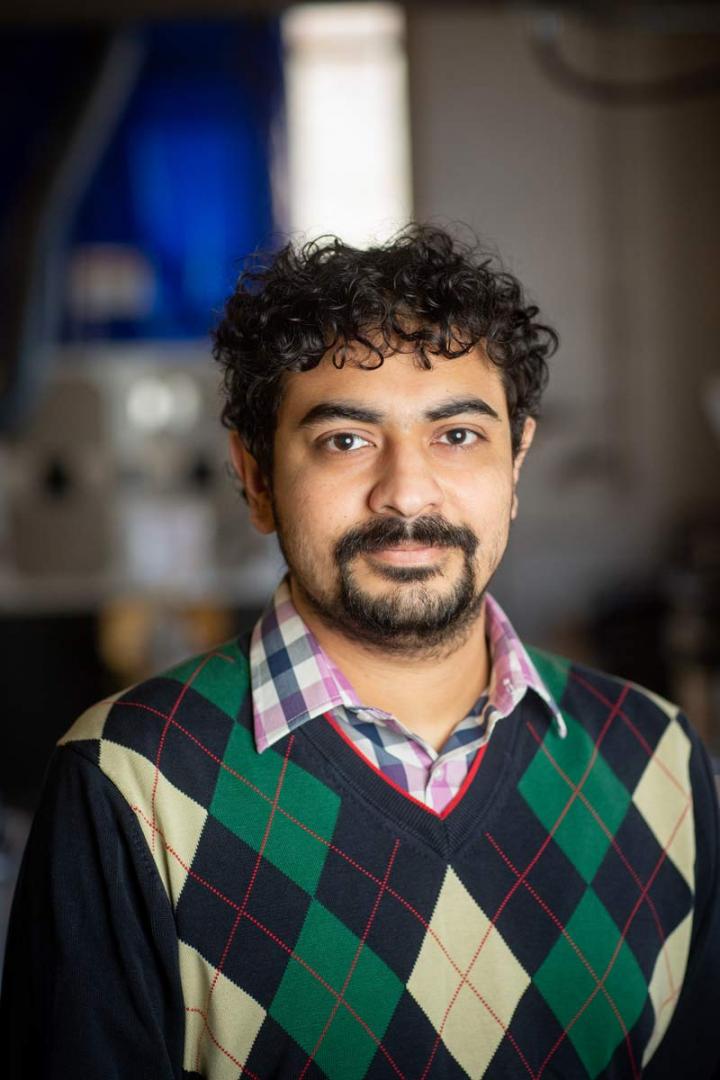Lehigh University MechE professor utilizes supercomputing to facilitate the successful manufacture of multi-principal element alloys

Credit: Douglas Benedict/Academic Image for Lehigh University
It’s never easy to shift a paradigm. Which makes compelling efforts to do so worthy of attention. The kind that comes with a Faculty Early Career Development Program (CAREER) award.
Such is the case for Ganesh Balasubramanian, a P.C. Rossin Assistant Professor of Mechanical Engineering and Mechanics. He recently received a grant from the National Science Foundation for his proposal to build a predictive framework to manufacture multi-principal element alloys (MPEAs) and engineer surfaces with their coatings.
The NSF CAREER program is considered one of the more prestigious awards granted by the NSF. They are awarded annually in support of junior faculty members across the U.S. who exemplify the role of teacher-scholars through outstanding research, excellent education, and the integration of education and research. Each award provides stable support at the level of approximately $500,000 for a five-year period.
“The general paradigm in manufacturing has been build, test, repeat,” says Balasubramanian. “With this proposal, we’re adding a layer so that the process becomes predict, build, test, repeat. Before you actually build anything, you’re predicting what-if conditions for the process based on data from simulations and experiments. You can then use that information to guide and streamline the manufacturing process.”
Balasubramanian and his team will be applying this paradigm shift to the manufacture of multi-principal element alloys. MPEAs are a new class of materials that are generally composed of five or more metals of equal proportion–unlike conventional alloys such as steel, which is mostly made of iron. Preliminary studies have demonstrated that MPEAs have superior mechanical strength and hardness, making them ideal as a protective coating on components like turbine blades, medical implants, ship surfaces, and aerospace parts.
“Those are all things that have to be strong and resist wear, corrosion, and extreme temperatures,” he says. “For example, let’s say a component on a space vehicle cracks or disintegrates under the thermal stress it experiences upon reentry. You could replace that material with something that could better withstand high temperatures, but then you’d be adding weight, and you don’t want to do that. Ideally, you want to add something to the surface of that component that protects it while retaining the properties of the material beneath it.”
The effective processing of MPEAs, however, has been elusive.
“We have preliminary evidence that this alloy can provide a technological advantage,” he says, “but we don’t know the theory behind all their properties and so we can’t make them in a repeatable fashion.”
Balasubramanian’s CAREER award supports the collection of data that will help guide the manufacturing process of these alloys. The data will be gathered through computational predictions, quantification of uncertainties, and experimental characterization. Such information will essentially create a statistical record of what worked and what didn’t in previous processing attempts. Researchers can then use those data points in a predictive way, incorporating them into their next round of processing, and ultimately move closer to successful repeatability in MPEA manufacturing.
“People have added the predictive layer before, but more in terms of theoretical models,” says Balasubramanian. “They haven’t really made extensive use of the data that is being generated to improve the manufacturing process.”
The potential impact of his research is significant and applicable to a range of technical areas including propulsion, machinery, transportation, and medical devices. For one, Balasubramanian estimates it will accelerate the manufacturing process by about 50 percent and reduce the costs associated with the material and process design phase. His predictive framework will also deal with scenarios where the problems may be different–instead of a spacecraft experiencing thermal stress, a ship that endures a corrosive marine environment–but the materials problem is similar. “You can use the previous data to guide you so you don’t have to make 1000 samples to see what works, you could just make 10.”
And finally, it could push the industry closer to smart manufacturing by building artificial intelligence and supercomputing into the fabrication process.
It’s been validating for Balasubramanian to learn the NSF supports his vision.
“Data is constantly being generated by the things we do,” he says. “So why don’t we take advantage of that, and formalize the process of manufacturing? We can potentially accelerate the process and minimize our chances of loss. This is a unique opportunity to change the way we look at fabricating things.”
###
About Ganesh Balasubramanian
Ganesh Balasubramanian is a P. C. Rossin Assistant Professor in the Department of Mechanical Engineering and Mechanics at Lehigh University’s P.C. Rossin College of Engineering and Applied Science. He received his BME degree in mechanical engineering from Jadavpur University (India) in 2007 and his PhD in engineering mechanics from Virginia Tech in 2011, and he was a postdoctoral research associate in theoretical physical chemistry at TU Darmstadt (Germany) until the fall of 2012.
His research and teaching interests are in advanced energy and structural materials, nanoscale transport and mechanics, and predictive engineering. He is affiliated with the Institute for Functional Materials and Devices (I-FMD), the Institute for Institute for Data, Intelligent Systems, and Computation (I-DISC), and the Institute for Cyber Physical Infrastructure and Energy (I-CPIE) at Lehigh. Select recognitions include the NSF CAREER award, ASEE Outstanding New ME Educator award, AFRL Summer Faculty Fellowship, Graduate Man of the Year and Liviu Librescu Scholarship at Virginia Tech, and Young Engineering Fellowship from the Indian Institute of Science.
Related Links:
- Rossin College Faculty Profile: Ganesh Balasubramanian
- NSF Award Abstract: CAREER: Surface Engineering by Predictive Laser Deposition of Multi-Principal Element Alloys
- Group for Interfacial and Nanoengineering
- Institute for Cyber Physical Infrastructure and Energy (I-CPIE)
- Institute for Data, Intelligent Systems, and Computation (I-DISC)
- Institute for Functional Materials and Devices
Media Contact
Katie Kackenmeister
[email protected]
Original Source
https:/




